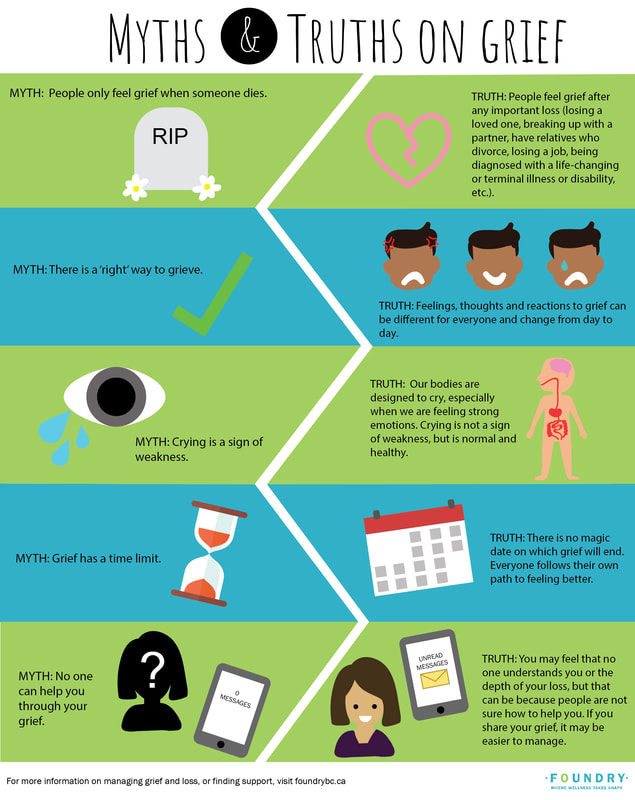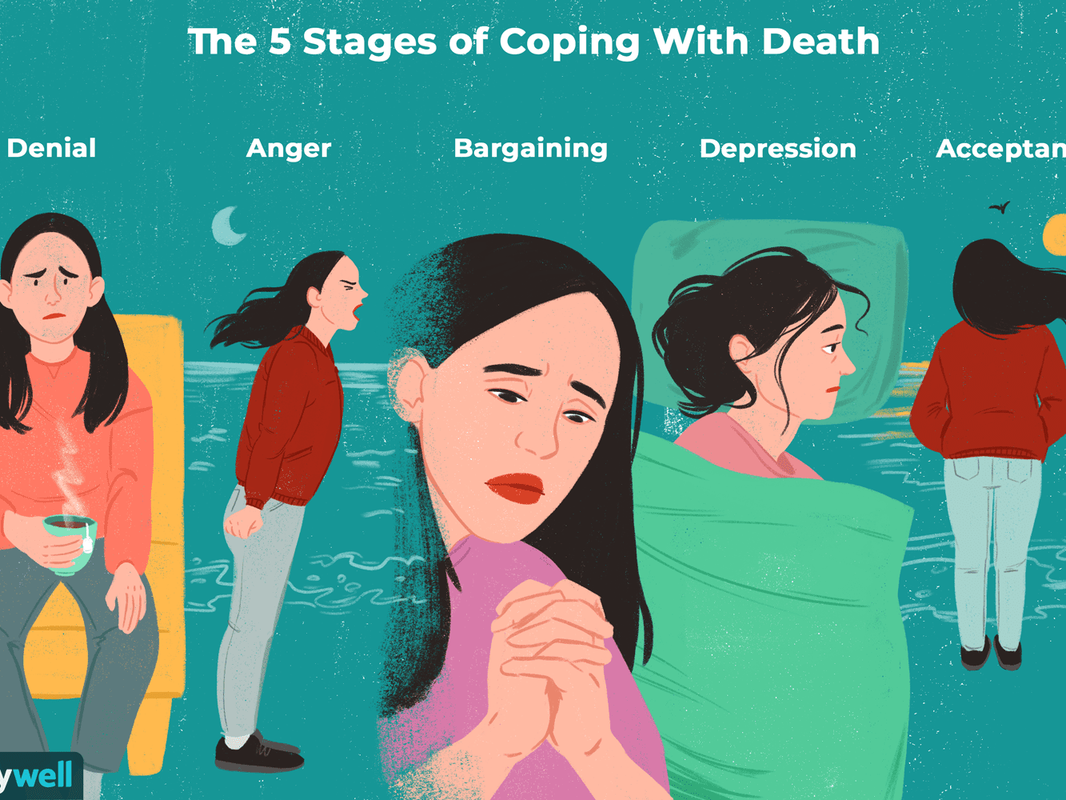|
Grief is a natural response to loss. It is the emotional suffering you feel when something or someone you love is taken away. The pain of the loss can sometimes be overwhelming. The more significant the loss the more severe the grief can be. Many people associate grief with the death of a loved one and this is often the most common cause of extreme grief, however any loss can cause grief. Below is a list of some other causes of grief.
1. Divorce or relationship breakups 2. Illness/ Sickness 3. Losing a job 4. Financial instability 5. A miscarriage 6. Retirement 7. Death of a pet 8. Loss of a dream 9. Loss of a friendship Whatever is the cause of your grief, it is important to know that there are healthy ways to cope with the pain, ease your sadness and help you come to terms with your loss as well as find new meaning, so that you can eventually move on with your life. The Grieving Process Grieving is a highly individual experience; there is no right or wrong way to grieve. How a person grieves depends on many factors, including their personality, their coping style, their life experience, their faith, and how significant the loss was to them. There is no “normal” timetable for grieving. Some people start to feel better in weeks or months. For others, the grieving process may take years. Healing happens gradually and it cannot be forced or rushed. It is important to have patience and allow the process to naturally evolve. Attempting to suppress or deny grief could possibly prolong the process. The 5 stages of Grief There are five stages of grief (according to a psychiatrist name Elisabeth Kübler-Ross). Many people do not experience the stages of grief in order, and this is actually normal. Persons often move between stages before achieving a more peaceful acceptance of loss. 1. Denial: (This cannot be happening to me.) Generally, the first reaction to learning about a serious illness, death of a loved one or any loss is to deny the reality of the situation. It is a normal reaction. 2. Anger: (Why is this happening? Who is to blame?) After the disguising effects of ‘denial’ wears off, reality sets in and the pain begins. This intense emotion may come from a feeling of vulnerability. The anger may be directed at random objects, complete strangers, friends or even family. 3. Bargaining: (Make this not happen, and in return I will …...) The normal reaction to feelings of helplessness and vulnerability is often a need to regain control through bargaining. People may make a deal with God or a higher power in an attempt to delay the inevitable pain. (Guilt is often associated with bargaining. Persons may start to believe that there was something they could have done differently to have helped save their loved one or prevent the loss.) 4. Depression: (I’m too sad to do anything.) Sadness is expected from anyone who has experienced a loss. Some people may choose to isolate themselves from others in order to fully cope. Depression can be overwhelming. 5. Acceptance: (I am at peace with what happened.) Not everyone can reach to this stage. This phase is distinct for withdrawal and calmness. Acceptance is not necessarily a happy stage, nor does it mean that a person has moved past their grief or loss. However it does mean that the person has accepted the loss and has come to understand what it means to them. Symptoms of Grief While loss affects people in different ways, many persons experience similar symptoms when grieving. (Additionally, it is very common in the early stages of grief for persons to feel like they are “going crazy”, feeling like they are in a bad dream, or question their religious or spiritual beliefs.) Common emotional symptoms of grief include: shock, disbelief, sadness, anger, guilt, fear. Common physical symptoms of grief include: fatigue, nausea, lowered immunity, weight changes, aches and pains, insomnia. Complicated Grief and Depression The sadness of losing someone you love never goes away completely, but it should not remain in the limelight. Complicated Grief is a condition where a person is stuck in an intense state of mourning. Persons may have trouble accepting the loss long after it has occurred or be so preoccupied with it that it disrupts their daily routine and affects their relationship with others. Differentiating between grief and depression can be difficult because they share many symptoms. However, grief can be considered a “roller coaster” as it involves a range of emotions and a mix of good and bad days. With depression the feelings of sadness and hopelessness are constant. Coping with Grief Seeking Support Tip#1: Talk to friends and family members Talk with people who care about you. You can tell them ways that they can help you. Sometimes you can talk about your loss, other times you can just spend time together. Tip#2: Pull comfort from your faith If you follow a religious tradition or spiritual practice, you can embrace the comfort that its mourning rituals can provide. Spiritual activities such as praying, meditating, or going to church can be helpful. It is ok if you are questioning your faith during this time, you can consider talking to persons in your religious community. Tip#3: Join a support Group Grief can feel very lonely even when you have loved ones around. Sharing your sorrow with others who have experienced similar losses can be helpful. Tip#4: Talk to a therapist or grief counselor If your grief feels too unbearable, you can find a mental health professional such as a therapist or counselor, who can help you work through the grieving process. Taking care of yourself Tip#5: Face your feelings You can try to suppress your grief, but you cannot avoid it forever. Acknowledging the pain is necessary for healing. Avoiding feelings of sadness and loss only prolongs the grieving process. Unresolved grief can also lead to complications such as depression, anxiety, substance abuse, and health problems. Tip#6: Express your feelings in a creative way Creating tangible memories about a lost loved one could help with healing. Writing about them in a journal, writing them a letter, creating a photo album or getting involved in a cause that was important to them can be very helpful. Tip#7: Try to maintain your hobbies and interests Getting back to your routine and doing the activities that you love can also help with the grieving process. Tip#8: Own your feelings Everyone is different, so no one can tell you when it is time to “move on” or “get over it.” You are allowed to feel whatever you feel without shame or judgment. It is okay to be angry, to cry, to not cry, to laugh and to let go when you are ready. Tip#9: Plan ahead for grief triggers Anniversaries, holidays, milestones and even something as simple as a photo or a song can spark memories of the loss and sad feelings. Be prepared for an emotional upset, and know that it is completely normal. Tip#10: Look after your physical health. Prevent stress and fatigue by getting enough sleep, eating right, and exercising. Avoid using alcohol or drugs to numb the pain or lift your mood artificially, as these will wear off and could make you more sad. I hope these tips on GRIEF were helpful. Remember your (Mental) Health is Invaluable. Dr. J. L. Matthew MBBS Acknowledgements Help Guide https://www.helpguide.org/articles/grief/coping-with-grief-and-loss.htm Psychology Today https://www.psychologytoday.com/us/basics/grief Psych Central https://psychcentral.com/lib/the-5-stages-of-loss-and-grief#5.-Acceptance Images: Foundry https://foundrybc.ca/articles/myths-about-grieving/ Very Well Health https://www.verywellhealth.com/dabda-the-five-stages-of-coping-with-death-1132148
1 Comment
|
AuthorDr. J. Lawarna Matthew Archives
January 2021
Categories |


 RSS Feed
RSS Feed
